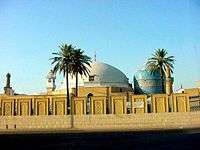Usman Harooni
Usman Harooni was an early modern wali or "saint" of Sufi Islam in India, a successor to Shareef Zandani, fourteenth link in the Silsila of the Chishti order, and master of Moinuddin Chishti. Usman Harooni was born in Haroon, Iran. His year of birth is variously given as 1096, 1116 and 1131 AD (490, 510 and 526 AH). He is also known by the nicknames Abu Noor and Abu Mansur.
Early life
When he was young, he met a mystic named Chirk. This association brought about a significant transformation in his life. As a result, he decided to seek a higher moral and spiritual life.
Harooni later met Shareef Zandani, a mystic and saint of the Chishti order, and requested to enroll as his spiritual disciple. Zandani accepted his request by placing a four-edged cap upon his head.
Zandani told him that the four-edged cap implied the following four things:
- First is the renunciation of this world;
- Second is the renunciation of the world hereafter;
- Third is the renunciation of the desires of the self;
- Fourth is the renunciation of everything other than God.
Mystic
Harooni spent over thirty years in the company of his spiritual guide. During this period, he engaged in ascetic practices and prayers. As time passed, he gained many spiritual accomplishments. Zandani asked him guide to move on and spread the gospel of truth.
Spiritual lineage
The traditional silsila (spiritual lineage) of the Chishti order is as follows
- Hasan of Basra, d. 728, an early Persian Muslim theologian
- 'Abdul Wāḥid Bin Zaid Abul Faḍl, d. 793, an early Sufi saint
- Al-Fudhayl bin 'Iyyadh
- Ibrahim ibn Adham, a legendary early Sufi ascetic
- Ḥudhayfah al-Mar'ashī
- Amīnuddīn Abū Ḥubayrah al-Baṣrī
- Mumshād Dīnwarī Al Alawi
- Abu Ishaq Shamī chishti (d. 940, founder of the Chishti order proper)
- Abu Abdaal Chishtī
- Naseruddin Abu Muhammad Chishtī
- Abu Yusuf Bin Saamaan, d. 1067
- Maudood Chishti, d. 1139
- Shareef Zandani, d. 1215 CE, 612 AH
- Usman Harooni
Disciples
Harooni had many disciples, including:
- Syed Khwaja Moinuddin Hassan Chisti
- Hazrat Sheikh Najmuddin Safri
- Sheikh Muhammad Turk ayman
Travels
Harooni traveled widely to preach. He visited many countries and cities, including Bukhara, Baghdad, Falooja, Damascus, and Mecca and Medina. He performed the Hajj.
In almost all cities, he visited Sufis and accomplished dervishes. On the way to Oosh, he met Sheikh Bahauddin of Oosh. When he reached Badakshan, he met one of the attendants of Hazrat Junayd of Baghdad.
During his travels, he was accompanied by Moinuddin Chishti, who carried his tiffin basket.
Harooni also visited India during the rule of Sultan Altamish; before returning to Arabia.
Death
Usman E Harooni Rahimullah died on 15 Shawaal, 617 AH (1220 AD). His Urs take place every year in Belchi on 15 of Shawaal. His blessings are invoked by people belonging to every strata of society and every school of thought. His actual tomb is in Mecca and a symbolic shrine was established in Belchi. A symbol of his strength and a source of his blessings are found at the Usmani Chilla at Ajmer.
Message and teachings
According to Usman Harooni, a great man is one who is endowed with virtues such as contentment, sincerity, self-abnegation, self-sacrifice and above all, spirit of renunciation. He said that the ego was an enemy, as it did not allow rational thought, wise actions and a happy life. He emphasized that unless a man loves human beings, it is impossible for him to love God.
